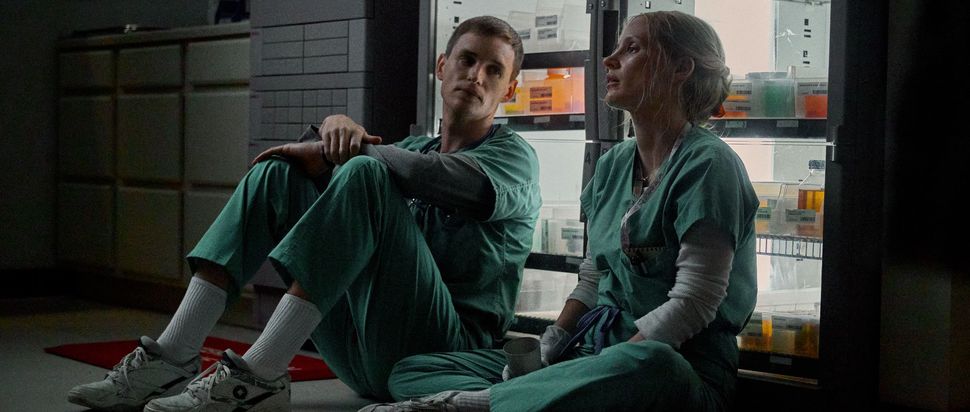Scotland on Screen: Krysty Wilson-Cairns of The Good Nurse
With films like 1917, Last Night in Soho and now The Good Nurse under her belt, Krysty Wilson-Cairns is now an established screenwriting force in Hollywood, but she explains that it all started at the old Global Video in Glasgow's Southside
Krysty Wilson-Cairns, the Oscar-nominated screenwriter of 1917, is eager to share her fond memories of growing up in Glasgow’s Southside. “We would go to Global Video three times a week, you know, three for £5 video rental,” she says. “We watched everything, we'd watch with subtitles, it didn’t matter. My grandparents would call it the Kinema, like really Glaswegian. I think if my grandparents and my mum had been given the start in life I had, they would have all been much better writers than me.”
After studying at the Royal Conservatoire of Scotland, Wilson-Cairns did her Masters at London’s National Film and Television School. Her dark and violent sci-fi script Aether made it on to The Black List, the prestigious annual collection of the year’s best unproduced screenplays, that led to her signing with an agent. The Good Nurse, the true-crime thriller about America’s most prolific serial killer, was actually the first project she was attached to after signing, but despite all the stars aligning – Danish director Tobias Lindholm, Jessica Chastain and Eddie Redmayne were all attached – it took a long time to take off.
“We were all ready to go, and then it all fell apart overnight,” she recalls. “It was like, this isn't going to work, the time’s not working, something to do with the rights like – all this stuff that happens. And I thought, ‘Well, that’s a shame,’ because at this point I'd spent maybe five years on it.” Such a drawn-out pre-production process had given her an unselfish love for the material. “I remember thinking that I wouldn’t mind if someone else started adapting this book just because I think the story is so important.”
It wasn’t until 1917 and Last Night in Soho (Wilson-Cairns's collaboration with Edgar Wright) were in production that the ball start rolling again on The Good Nurse. With such a packed schedule, Wilson-Cairns was probably relieved to have spent those five years on the script, as research isn’t just crucial to her process – it’s her favourite part. “I'm not an authority on medicine,” she says. “I wasn't an authority in the First World War. I'm not an authority on 1960s Soho. So you have to totally immerse yourself in the world. So I'll listen to the music. I'll read diaries, first-hand accounts – for 1917, I spent the better part of six months constantly reading or going to the Imperial War Museum and listening to recordings of the veterans – so you understand how people speak as well. It’s also the best way to procrastinate.”
She hasn’t had much time to procrastinate recently, and she’s not likely to have much downtime in the near future. Like any working screenwriter, she has an extensive back-catalogue of unproduced screenplays, and she’s now assessing them with fresh eyes. “It's really weird as a writer going back to read Aether, because I hadn't read it in maybe nine-ish years. When I wrote it, both my grandparents had Alzheimer's. My grandfather had recently died and my gran had Alzheimer's but was really fit and healthy, and became a violent woman. It was just my mum and I looking after her, and I was really depressed. I suppose when I read Aether I think, ‘Oh, my God, you were really struggling. You really thought the world was terrible. You really thought this was a bad place.’ I think reading your old work is like having a conversation with your old self.”
Wilson-Cairns doesn’t believe this old self would be able to tackle The Good Nurse, in no small part due to the difficulty of adapting true crime as an inexperienced writer. “It's very difficult to get the rights to these kinds of things,” she explains. “To really accurately portray true crime, I call it both a burden and a privilege because you are writing about other people's lives. I think you really have to take that responsibility seriously and get it right, and I think in film school, even I knew that I wasn't ready for that responsibility. Nor did I have the infrastructure around me to make sure that you could tell the stories respectfully.”
It’s a fine line, especially as all her produced work is filled with violence and darkness. “I find with each script, with each story, you have to work out what the touchstone is,” she explains. “I wouldn't really call myself an optimist, but I'm not that much of a pessimist. I think what each of these stories has in common is actually this real pinhole of pure light.”
But it’s those childhood days of renting videos that most influence her writing now. “I always believed that movies should be entertainment,” she says. “No matter what the story is that you're trying to tell, no matter how serious it is. If you're going to speak to people in the dark, you should make sure that they're having a fun time.”
Filmography: The Good Nurse (2022), Last Night in Soho (2021), 1917 (2019), Penny Dreadful (TV, 2016), Fink (short, 2013), Dollface (short, 2013), The End of an Era (short, 2012), All Men's Dead (short, 2012)
Instagram: @krystycairns
Twitter: @WeWriteAtDawn
The Good Nurse is streaming on Netflix now
